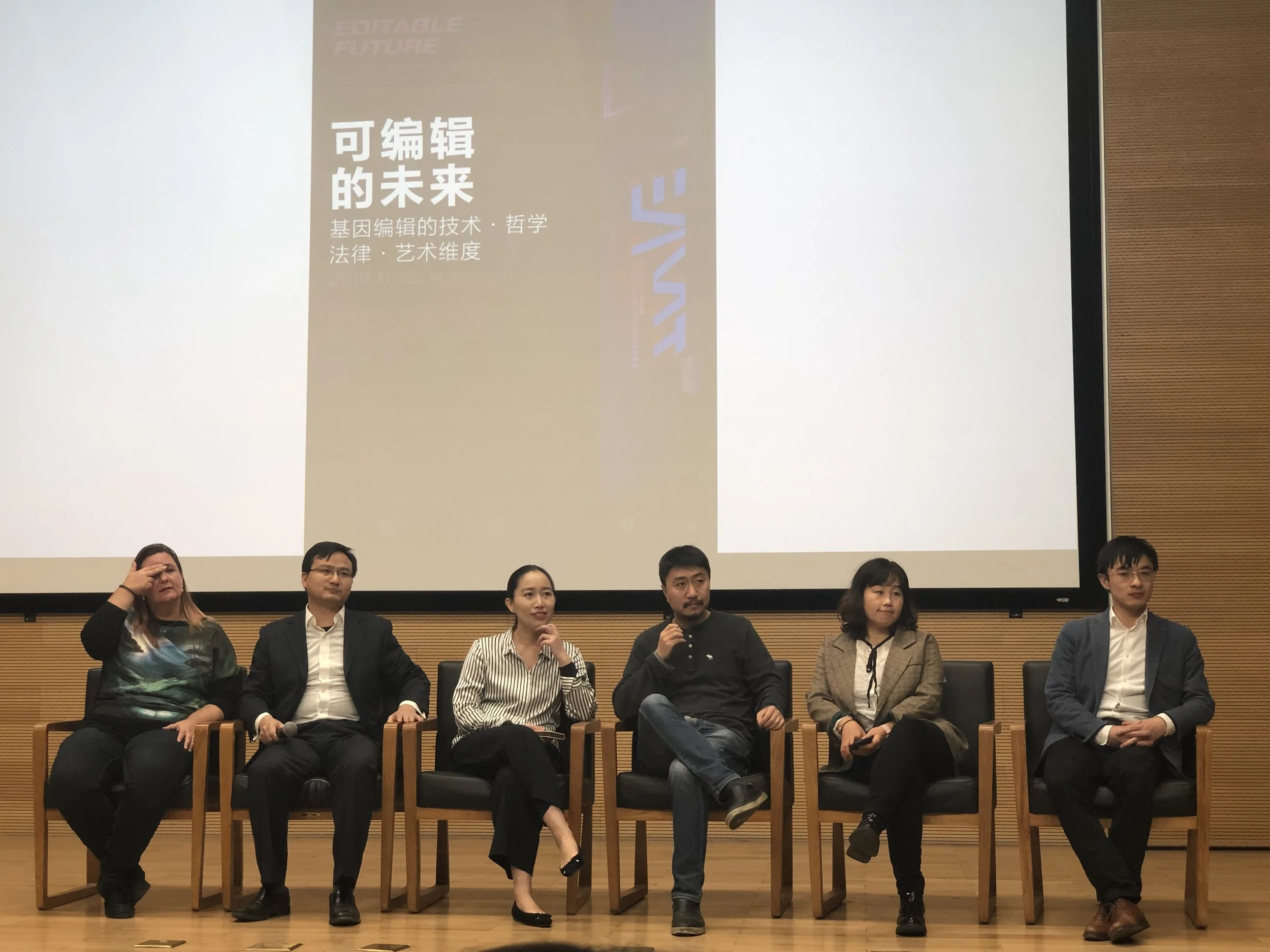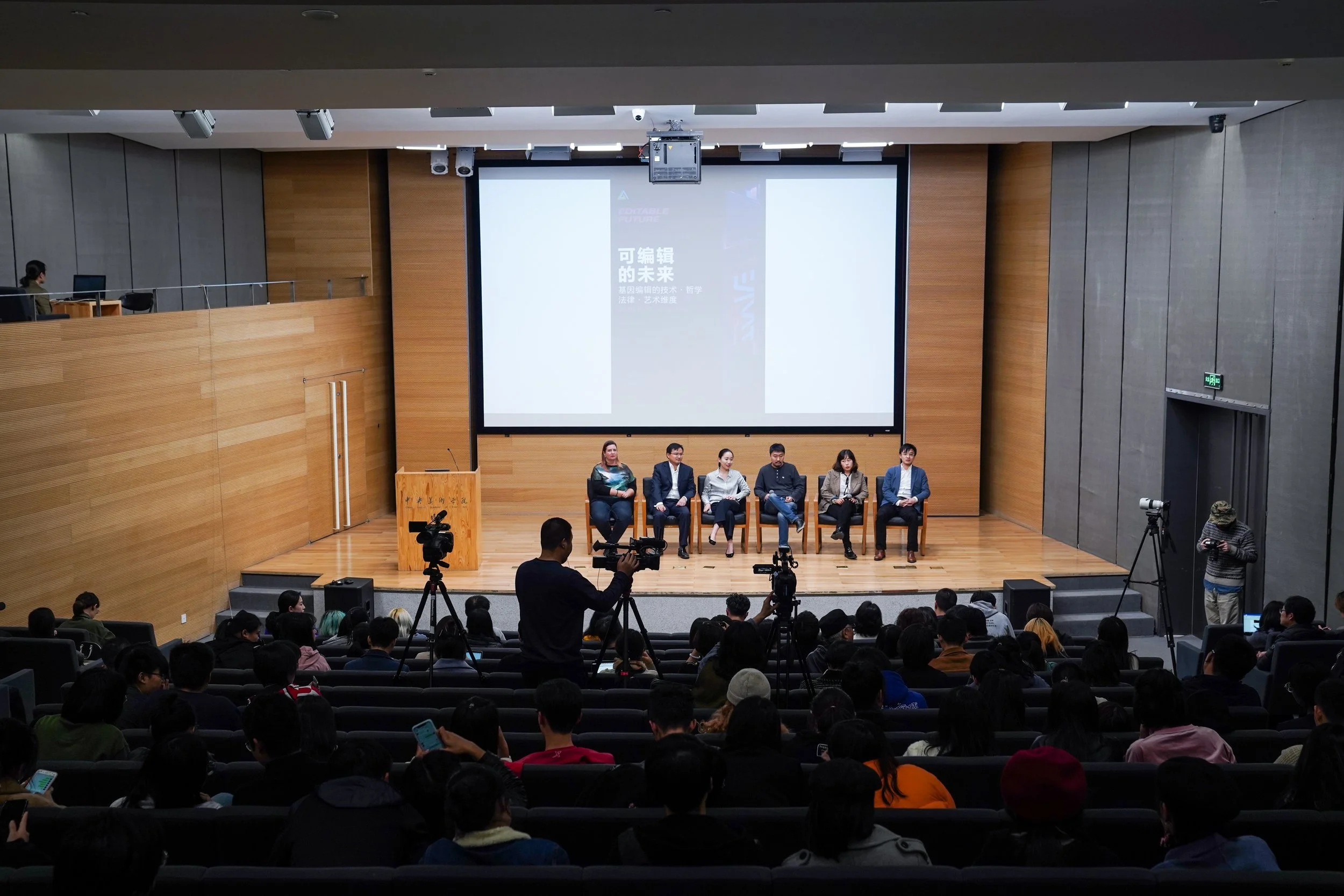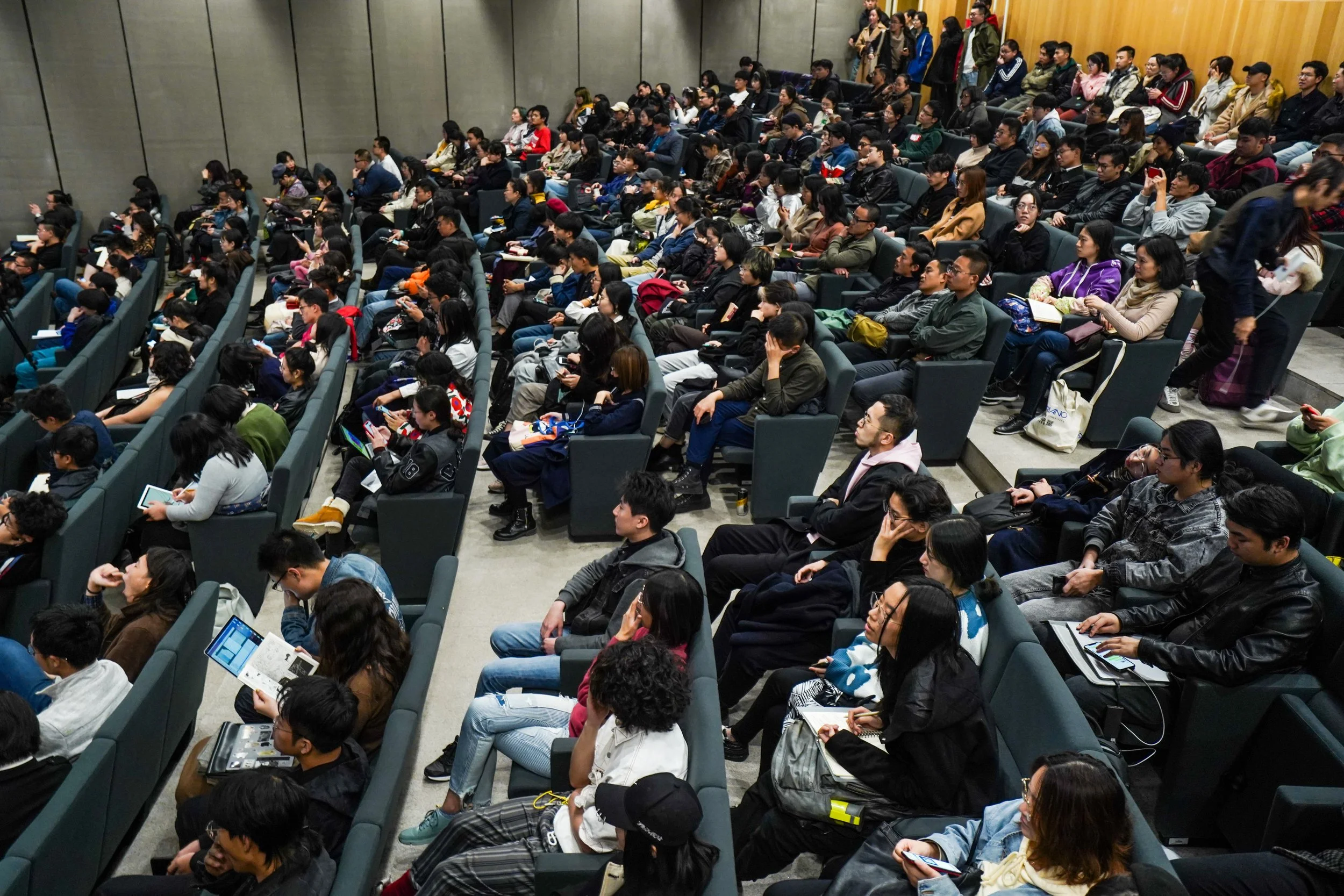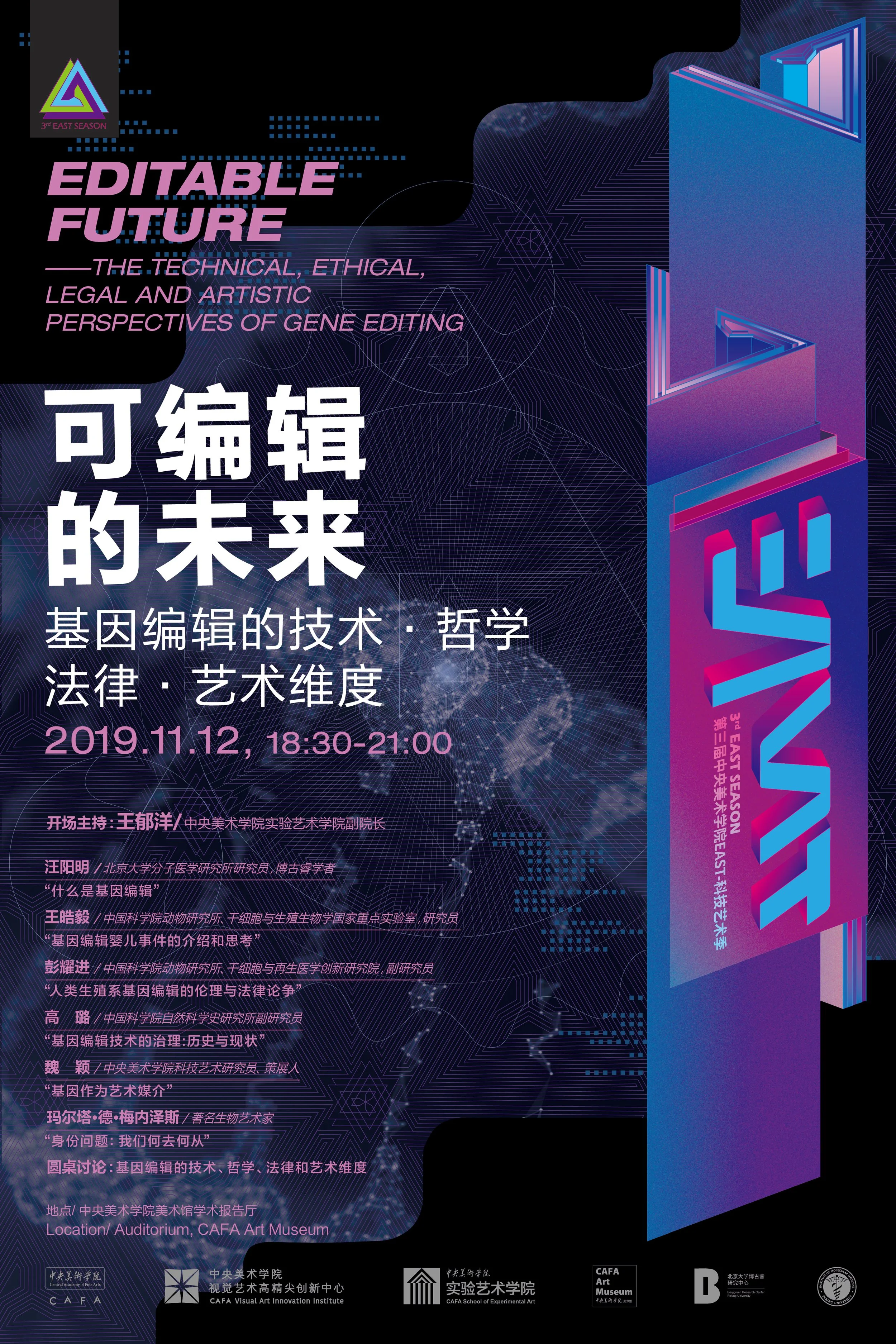Editable Future: The Technical, Ethical, Legal and Artistic Perspectives of Gene Editing
可编辑的未来:基因编辑的技术、哲学、法律和艺术维度
Date: 2019.11.12
Location: CAFA Art Museum, Beijing, China
Curating: Jo WEI & Berggruen Research Center Peking University
日期:2019.11.12
地址:中央美术学院美术馆报告厅,北京,中国
项目策划:魏颖 & 北京大学博古睿研究中心团队
中央美术学院链接:可编辑的未来
博古睿研究所链接:如果未来可以“被编辑”
Intro | 项目介绍
This lecture invites six researchers from different fields related to gene editing into a dialogue. Their research interests span molecular biology, policy making and legislation on science and technology, bio art, and more. The discussion will begin from a scientific and technological perspective, gradually expanding to social ethics and philosophical exploration, and ultimately focusing on art. The six speakers will each give a lecture on their respective topics, followed by a roundtable discussion.
A Brief Introduction of Genome Editing Technology
Yangming WANG (Principal Investigator of the Institute of Molecular Medicine and Berggruen fellow at Peking University)
Wang studies the function of noncoding RNAs-the dark matter of our genome-and stem cells that hold potential to cure a variety of diseases such as diabetes and neurodegenerative diseases. He has systematically dissected the function of microRNAs in embryonic stem cells and invented a microRNA-inducible CRISPR platform for controllable genome editing in mammalian cells. He is broadly interested in the impact of cutting-edge biotechnology development such as genome editing, DNA sequencing and genetic diagnosis, and stem cell therapy on human society.
Gene Edited Babies: What went wrong and what could go wrong
Haoyi WANG (Principle Investigator of the State Key Laboratory of Stem Cell and Reproductive Biology, Institute of Zoology, Chinese Academy of Sciences)
Wang has developed of a variety of genome engineering technologies, including transposon-based method for determining the binding specificity of transcription factors, TALEN- and CRISPR-mediated genome editing in human pluripotent stem cells and mice. His current research interests are 1. Developing novel tools for genome engineering; 2. Establishment of novel therapeutic methods using gene editing; 3. Study the mechanism of X chromosome inactivation in human using stem cell and CRISPR technologies.
Ethical and Legal Controversies concerning Human Germline Genome Editing
Yaojin PENG (Associate professor at the Institute of Zoology (IOZ), Innovation Academy for Stem Cell and Regeneration, Chinese Academy of Sciences)
Peng holds a Bachelor’s degree in life science and a Ph.D in Law (Maastricht University, the Netherlands). He was a visiting scholar at Singapore Management University (SMU). His research focuses on biotechnology law and ethics, intellectual property rights and standardization, S&T and innovation policies, etc.
The Governance of Biotechnology: the Wisdom of the History and the Challenge of the Emerging Gene Editting
Lu GAO (Associate professor in Institute for the History of Natural Sciences, Chinese Academy of Sciences)
Gao received her Phd in STS Center, Tsinghua University. She was visiting scholars of ISSTI of Edinburgh University, and East Asia Center at Stanford University. Her research focuses on the governance of emerging technologies, especially life sciences. She has been published more than 20 papers about biotech governance, the history of bioethics.
Gene as Artistic Media
Jo WEI (Researcher of Art, Science and Technology (AST) in the Central Academy of Fine Arts, Curator)
Jo Wei is a curator, researcher and the founder of the Pan Bio-Art Studio (PBS). She is currently a researcher of Art, Science and Technology (AST) in the Central Academy of Fine Arts (CAFA), Beijing. Her recent research interests include AST in a posthuman context, bio art/bio design, ecological art and others. Among the list of her many curations are Ars Electronica in Shenzhen (2019, Shenzhen), Quasi-Nature: Bio Art, Borderline, Laboratory (2019, Beijing), and When Forms do not Become Attitude (2016, Beijing). Wei was the co-curator of 1st and 2nd edition of Beijing Media Art Biennale and International Adviser for the European Commission’s 2019 STARTS Prize.
Identity issues: Where do we come from? What are we? Where are we going
Marta de Menezes (Artist)
Marta de Menezes’ work explores the possibilities modern biology offers to artists. She has been developing, for the last 20 years, the use of biology and biotechnology as new art media, conducting her practice in research laboratories that also are her art studios.
Besides the works by de Menezes like first seminal bioart project entitled “Nature?” (1998) that questions the definition of nature through a non-genetic manipulation of live butterfly wing patterns, and her most recent projects that use the technology of CRISPR-cas9 to reengage with questions of identity as a species, as animals, as composites, and multiples – and how we understand these concepts in relation to our future.
本次讲座邀请六位与基因编辑相关的各领域研究者参与对话,他们的研究方向覆盖分子生物学、科技政策、科技法律、生物艺术等。讨论从科学和技术维度开始,逐渐延展至社会伦理与哲学探讨层面,并最终落实为如何用艺术来表达所有的困惑和希望。六位讲者将各自做一个独立主题讲座,最后形成圆桌讨论。
什么是基因编辑
汪阳明(北京大学分子医学研究所研究员,博古睿学者)
基因编辑婴儿事件的介绍和思考
王皓毅(干细胞与生殖生物学国家重点实验室、中国科学院动物研究所,研究员)
人生殖系基因编辑的伦理与法律论争
彭耀进(中国科学院动物研究所、干细胞与再生医学创新研究院,副研究员)
基因编辑技术的治理:历史与现状
高璐(中国科学院自然科学史研究所副研究员,爱丁堡大学、斯坦福大学访问学者)
基因作为艺术媒介
魏颖(中央美术学院科技艺术研究员、策展人)
身份问题
玛尔塔·德·梅内泽斯(艺术家)
圆桌讨论:基因编辑的技术、哲学、法律和艺术维度
Photos of Scene | 现场




